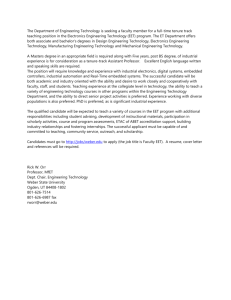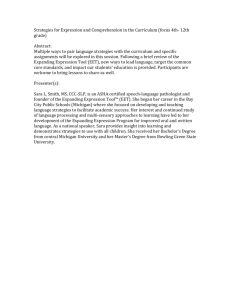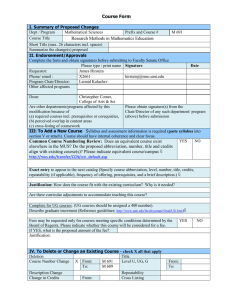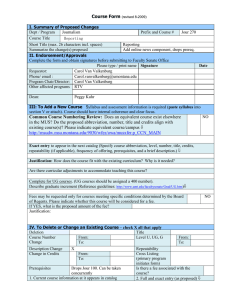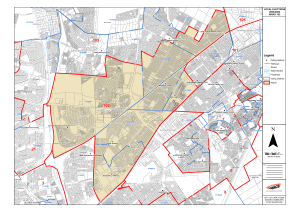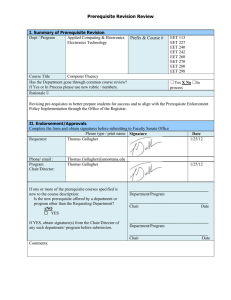Course Form
advertisement
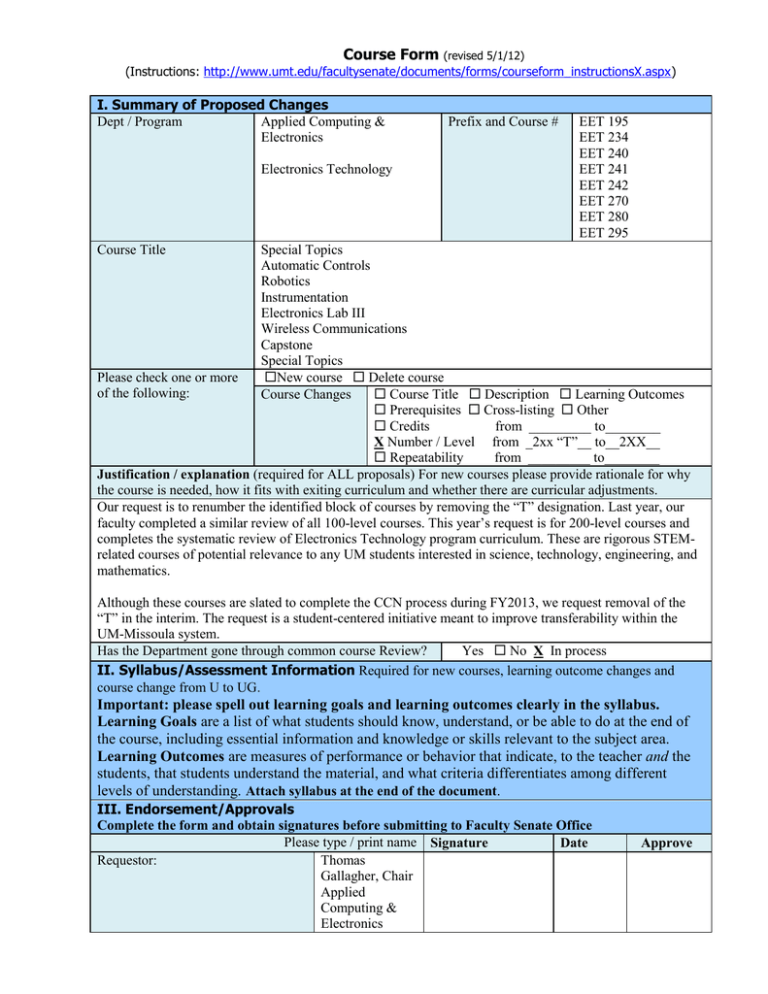
Course Form (revised 5/1/12) (Instructions: http://www.umt.edu/facultysenate/documents/forms/courseform_instructionsX.aspx) I. Summary of Proposed Changes Dept / Program Applied Computing & Electronics Electronics Technology Prefix and Course # EET 195 EET 234 EET 240 EET 241 EET 242 EET 270 EET 280 EET 295 Course Title Special Topics Automatic Controls Robotics Instrumentation Electronics Lab III Wireless Communications Capstone Special Topics Please check one or more New course Delete course of the following: Course Changes Course Title Description Learning Outcomes Prerequisites Cross-listing Other Credits from _________ to________ X Number / Level from _2xx “T”__ to__2XX__ Repeatability from _________ to________ Justification / explanation (required for ALL proposals) For new courses please provide rationale for why the course is needed, how it fits with exiting curriculum and whether there are curricular adjustments. Our request is to renumber the identified block of courses by removing the “T” designation. Last year, our faculty completed a similar review of all 100-level courses. This year’s request is for 200-level courses and completes the systematic review of Electronics Technology program curriculum. These are rigorous STEMrelated courses of potential relevance to any UM students interested in science, technology, engineering, and mathematics. Although these courses are slated to complete the CCN process during FY2013, we request removal of the “T” in the interim. The request is a student-centered initiative meant to improve transferability within the UM-Missoula system. Has the Department gone through common course Review? Yes No X In process II. Syllabus/Assessment Information Required for new courses, learning outcome changes and course change from U to UG. Important: please spell out learning goals and learning outcomes clearly in the syllabus. Learning Goals are a list of what students should know, understand, or be able to do at the end of the course, including essential information and knowledge or skills relevant to the subject area. Learning Outcomes are measures of performance or behavior that indicate, to the teacher and the students, that students understand the material, and what criteria differentiates among different levels of understanding. Attach syllabus at the end of the document. III. Endorsement/Approvals Complete the form and obtain signatures before submitting to Faculty Senate Office Please type / print name Signature Date Requestor: Thomas Gallagher, Chair Applied Computing & Electronics Approve Phone/ email : Program Chair(s)/Director: Dean(s): 7814 Thomas.gallaghe r@umontana.edu Thomas Gallagher Lynn Stocking Steve Shen, PhD Director Electronics Technology Are other departments/programs affected by this modification because of (a) required courses incl. prerequisites or corequisites, (b) perceived overlap in content areas (c) cross-listing of coursework Signatory Comments (required for disapproval): Yes No Yes No Yes No Yes No All other affected programs: Yes No Yes No Please obtain signature(s) from the Chair/Director of any such department/ program (above) before submission IV: To Add a New Course Syllabus and assessment information is required (paste syllabus into section V or attach). Course should have internal coherence and clear focus. Common Course Numbering Review (Department Chair Must Initial): YES NO Does an equivalent course exist elsewhere in the MUS? Check all relevant disciplines if course is interdisciplinary. (http://www.mus.edu/Qtools/CCN/ccn_default.asp) If YES: Do the proposed abbreviation, number, title and credits align with existing course(s)? Please indicate equivalent course/campus. If NO: Course may be unique, but is subject to common course review. The course number may be changed at the system level. Short Title (max. 26 characters incl. spaces) Exact entry to appear in the next catalog (Specify course abbreviation, level, number, title, credits, repeatability (if applicable), frequency of offering, prerequisites, and a brief description.) Complete for UG courses (UG courses should be assigned a 400 number). Describe graduate increment - see procedure 301.30 http://www.umt.edu/facultysenate/procedures/default.aspx Complete for Co-convened courses Companion course number, title, and description (include syllabus of companion course in section V) See procedure 301.20 http://www.umt.edu/facultysenate/procedures/default.aspx New fees and changes to existing fees are only approved once each biennium by the Board of Regents. The coordination of fee submission is administered by Administration and Finance. Fees may be requested only for courses meeting specific conditions according to Policy 940.12.1 http://mus.edu/borpol/bor900/940-12-1.pdf . Please indicate whether this course will be considered for a fee. If YES, what is the proposed amount of the fee? Justification: YES NO X V. Change an Existing Course 1. Current course information at it appears in catalog (http://www.umt.edu/catalog) Electronics Technology (EET) U 195T Special Topics 1-6 cr. (R-6) Offered Intermittently. Experimental offerings of visiting professors, experimental offerings of new courses, or onetime offerings of current topics. U 234T Automatic Controls 4 cr. Offered autumn. Prereq., EET 205. Explores the theory, terminology and components used in automatic control of industrial machines and processes. Uses the servomechanism as a representative control system to analyze open-loop, closedloop, proportional, integral, and differential control strategies. The use of transducers and computers in automatic control systems in the industrial control setting is emphasized. U 240T Robotics 3 cr. Offered spring. Prereq. or coreq., EET 205. Explores physical and operating characteristics of a robot. Topics include robot configurations, power supplies, control systems, end effectors, sensors, stepper motors and stepper controls. Robot programming also is covered and a typical robot is programmed to perform repetitive actions. Includes hands-on labs. U 241T Instrumentation 3 cr. Offered spring. Prereq., EET 227. The study and analysis of industrial measuring and process control instrumentation in both analog and digital form. Proper selection, use and interpretation of measurement equipment and data. U 242T Electronics Lab III 3 cr. Offered spring. Coreq., EET 241T Bread-boarding, building, repairing and troubleshooting electronic circuits using the equipment normally found in an electronic shop. Correlating measurement information in solving electronic problems. U 270T Wireless Communications 4 cr. Offered autumn. Prereq., EET 205. Explores audio and radio frequency (RF) circuits. Topics include AM and FM signal modulation and demodulation, RF transmitters, RF receivers, RF amplifiers, audio amplifiers, oscillators, mixers, and antennas. Includes hands-on labs. U 280T Electronics Capstone 2 cr. Offered spring. Prereq., EET 227. Completion of project prototypes. Includes comprehensive final project from conception to market. U 295T Special Topics 1-6 cr. (R-6) Offered Intermittently. Experimental offerings of visiting professors, experimental offerings of new courses, or onetime offerings of current topics. 2. Full and exact entry (as proposed) Electronics Technology (EET) U 195 Special Topics 1-6 cr. (R-6) Offered Intermittently. Experimental offerings of visiting professors, experimental offerings of new courses, or one-time offerings of current topics. U 234 Automatic Controls 4 cr. Offered autumn. Prereq., EET 205. Explores the theory, terminology and components used in automatic control of industrial machines and processes. Uses the servomechanism as a representative control system to analyze open-loop, closedloop, proportional, integral, and differential control strategies. The use of transducers and computers in automatic control systems in the industrial control setting is emphasized. U 240 Robotics 3 cr. Offered spring. Prereq. or coreq., EET 205. Explores physical and operating characteristics of a robot. Topics include robot configurations, power supplies, control systems, end effectors, sensors, stepper motors and stepper controls. Robot programming also is covered and a typical robot is programmed to perform repetitive actions. Includes hands-on labs. U 241 Instrumentation 3 cr. Offered spring. Prereq., EET 227. The study and analysis of industrial measuring and process control instrumentation in both analog and digital form. Proper selection, use and interpretation of measurement equipment and data. U 242 Electronics Lab III 3 cr. Offered spring. Coreq., EET 241T Bread-boarding, building, repairing and troubleshooting electronic circuits using the equipment normally found in an electronic shop. Correlating measurement information in solving electronic problems. U 270 Wireless Communications 4 cr. Offered autumn. Prereq., EET 205. Explores audio and radio frequency (RF) circuits. Topics include AM and FM signal modulation and demodulation, RF transmitters, RF receivers, RF amplifiers, audio amplifiers, oscillators, mixers, and antennas. Includes hands-on labs. U 280 Electronics Capstone 2 cr. Offered spring. Prereq., EET 227. Completion of project prototypes. Includes comprehensive final project from conception to market. U 295 Special Topics 1-6 cr. (R-6) Offered Intermittently. Experimental offerings of visiting professors, experimental offerings of new courses, or one-time offerings of current topics. 3. If cross-listed course: secondary program & course number 4. Is this a course with MUS Common Course Numbering? http://www.mus.edu/Qtools/CCN/ccn_default.asp If yes, please explain below whether the change will eliminate the common course status. YES NO X 5. If co-convened course: companion course number, title, and description (include syllabus of companion course in section V) See procedure 301.20 http://www.umt.edu/facultysenate/procedures/default.aspx 6. Graduate increment if level of course is changed to UG. Reference procedure 301.30: http://www.umt.edu/facultysenate/procedures/default.aspx Have you reviewed the graduate increment guidelines? Please check (X) space provided. (syllabus must be attached) 7. Other programs affected by the change None 8. Is there a fee associated with the course? Yes VI Department Summary (Required if several forms are submitted) In a separate document list course number, title, and proposed change for all proposals. VII Copies and Electronic Submission. After approval, submit original, one copy, summary of proposals and electronic file to the Faculty Senate Office, UH 221, camie.foos@mso.umt.edu.
